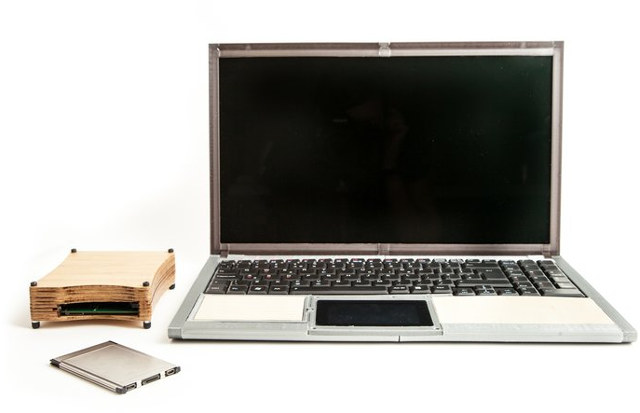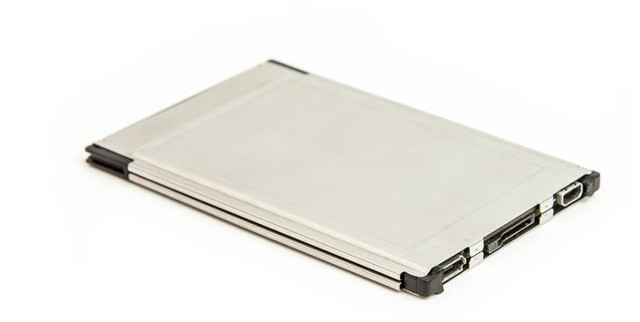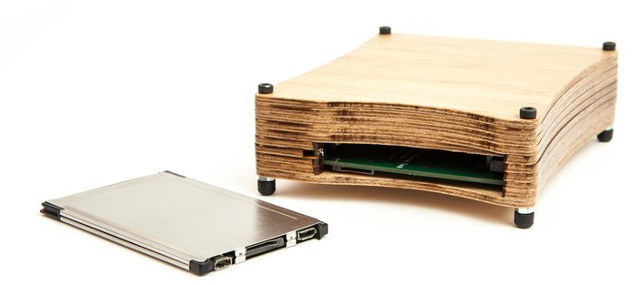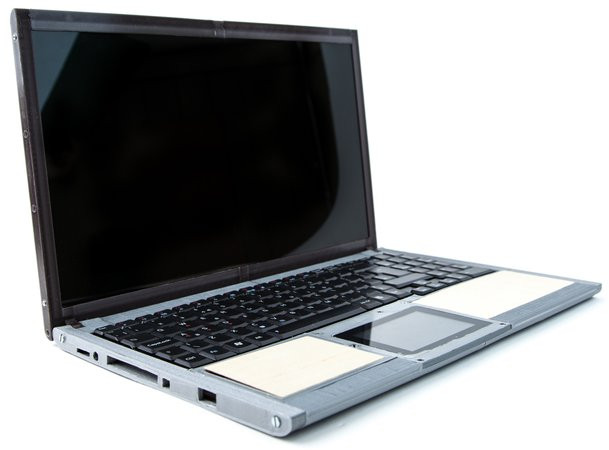Rhombus Tech has been working on EOMA68 standard for CPU modules based on PCMCIA at least since 2012, and after previous difficulties, they showcased a laptop prototype taking OEMA68 CPU cards at the beginning of the year, and they’ve now launched a CrowdSupply campaign selling an EOMA68 CPU card based on Allwinner A20 processor, as well as corresponding laptop and micro desktop housings that are both open source, and upgradeable with faster EOMA68 CPU card once/if they become available.
 Current EOMA68 CPU card specifications:
Current EOMA68 CPU card specifications:
- SoC – Allwinner A20 dual core ARM Cortex A7 processor @ 1.2 GHz with Mali-400MP2 GPU
- System Memory – 2GB RAM
- Storage – 8GB NAND flash + micro SD slot
- Video Output – micro HDMI Interface (for 2nd monitor)
- USB – micro USB OTG port
- Compliant with EOMA68 standard
 Two versions of the CPU card are offered with different pre-installed firmware:
Two versions of the CPU card are offered with different pre-installed firmware:
- “Libre Tea Computer Card” with Parabola GNU/Linux-libre Operating System and a Respects Your Freedom (RYF) hardware product certification from the Free Software Foundation (application in progress)
- “Practically Perfect Computer Card” with Debian and some close-source binary blobs for GPU drivers for example
 While you could use the CPU card by itself by powering it via micro USB port, connecting it an HDMI display, and adding USB keyboard and mouse through a USB hub, you may still want to get a housing such as the micro desktop:
While you could use the CPU card by itself by powering it via micro USB port, connecting it an HDMI display, and adding USB keyboard and mouse through a USB hub, you may still want to get a housing such as the micro desktop:
- EOMA68 Computer Card slot (user-upgradeable)
- Video Output – VGA port (micro HDMI is also available on CPU card)
- USB – 2x USB 2.0 ports
- Storage – One extra micro SD slot on board
- Power – 7 – 21 V DC via 5.5 power barrel
- Dimensions – 11.43 x 11.43 x 1.27 cm (laser-cut wooden case)
 The 3D printed laptop housing is also another option:
The 3D printed laptop housing is also another option:
- EOMA68 Computer Card slot (user-upgradeable)
- Display – 15.6” 1366 x 768 LCD
- Full-sized QWERTY Keyboard including numberpad
- 4.3” capacitive touch panel and backlit LCD
- Storage – 1x micro SD slot up to 256GB (on top of the one in the CPU card)
- USB – 3x USB 2.0 ports (2 internal, 1 external)
- Audio – 1W Stereo speakers, built-in Mic, CM108AH USB Audio with stereo headphone jack
- MCU – STM32F072 Embedded Controller with firmware under GPLv3 license
- Battery – 10,000 mAh good for 6 to 8 hours
- Weight – 1.1 kg weight
The full schematics, and 3D printer design files will be made available. There’s are also plywood panels on both sides of the capacitive touch screen.
The project appears to have two main goals which are not met by most products today: First providing a fully open source system without any closed-source binary blobs, and make computer systems that both earth-friendly as the user-serviceable CPU cards are supposed to reduce e-waste, and cost-saving to the end user as they only need to change the CPU card to get a faster device.
While both ideas are noble, but there are challenges. With Allwinner A20 processor going fully open source using Parabola Linux means that although hardware video decoding should work with the open source Cedrus implementation, you’ll lose 3D GPU acceleration at least, and most WiFi dongles will probably not work either. The Debian image won’t have this problem, but it’s not 100% open source. The idea of keeping the housing for main years, and only changing the CPU card is good, but hard to implement, as what may be acceptable today, may not be in the future. For example the display for the laptop is limited to 1366×768 resolution, and I already know many people who would not this resolution for a laptop, and in a few years the perception is likely to be worse. EOMA68 standards supports USB 1.x to USB 3.x, but both laptop and micro desktop housings appear to be limited to USB 2.0 connectors, so even if you purchase a more powerful CPU card with USB 3.0 interface in a few years, you won’t be able to enjoy the full capabilities of the new card. One solution would be to provide spare parts to repair or upgrade the laptop case, and that’s certainly possibly since the laptop is also designed to be easy assembled by yourself.
Rhombus Tech aims to raise at least $150,000 to fund mass-production for the project. The CPU card goes for $65, the micro desktop housing for $55, and the laptop housing for $500 with other various DIY or full kit rewards also offered. Shipping is free to the US, and adds $10 to $80 to the rest of the world depending on the chosen rewards.

Jean-Luc started CNX Software in 2010 as a part-time endeavor, before quitting his job as a software engineering manager, and starting to write daily news, and reviews full time later in 2011.
Support CNX Software! Donate via cryptocurrencies, become a Patron on Patreon, or purchase goods on Amazon or Aliexpress




